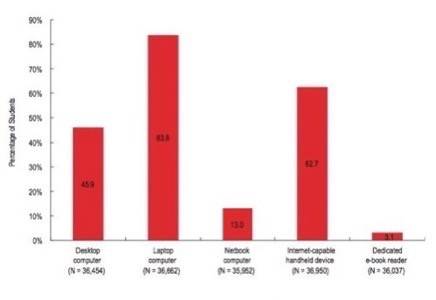Want to know what the future workforce thinks of technology, how it uses search engines, social networking, and online collaborative tools? The recently released ECAR Study of Undergraduate Students and Information Technology gives some excellent insights into trends in college students’ technology ownership, perceptions, skills, and habits.

The 2010 report was recently released by EDUCAUSE, a non-profit organization that supports the advancement of technology in higher education. The report is based on a survey from the spring of 2010 of over 36,950 freshmen and seniors at 100 four-year institutions and students at 27 two-year institutions.
Student Ownership of Technology
EDUCAUSE has been conducting these surveys for almost a decade now, so the results offer an interesting look at how students’ attitudes to technology have changed – and haven’t changed – over time. Consistent with previous years, for example, about half the respondents say they consider themselves to be mainstream adopters of technology. But about half of the male respondents see themselves as early adopters while only a quarter of females described themselves that way.
For the past four years, the percentage of respondents who own computers has stayed roughly the same: around 98%. But desktop ownership has declined by more than 25% over that period, with laptop ownership increasing accordingly. In 2010, 89% of students said they owned either a laptop or a netbook. More than half of respondents said their computers were less than a year old.
Despite the prevalence of laptops, eReaders have yet to make much in-roads with the college set, with only 4% owning a dedicated eReader. But two-thirds of the respondents say they own an Internet-capable handheld device.

Students’ Use of Technology (For Social Networking, Not for Studying)
Students report they use technology primarily to study. OK, not really. Communications – especially via text-messaging and social networking – is the primary usage (and daily usage) of technology.
96% of students said they were on Facebook. 23% said they were on MySpace. And of students active in social networking, fewer than 7% said they had no restrictions as to who could see their online profiles. 59% of women and only 40% of men said they’d put some restrictions in place as to who could view their social networking information.
Dissatisfied with Learning Management Systems, Students Turn to Social Networking to Collaborate
Despite the very high percentage of students who said they use social networking for personal reasons, very few said they use these sites as part of their coursework. Only 3 in 10 said as much, most of whom said they did so to collaborate with fellow students in their classes. Only 8% of respondents said they used social networking sites to interact with their instructors.
When asked if they would like to see more social networking in their classes, slightly more than 25% said they would.
And while 90% of institutions said they used online Learning Management Systems, students’ participation was not that high. While most students said they had used an LMS at some point, only two-thirds said they were using one during the semester when this survey was taken. And their experience was not positive. Over the last few studies that EDUCAUSE has undertaken, the percentage of respondents who feel positive or very positive about the LMS experience has dropped from 77% in 2007 to 51% in 2010.
In terms of other technologies being used by students, 36% said they used web-based productivity tools like Google Docs, 12% said they used blogs, and only 4% said they used microblogging services like Twitter in their courses.
As far as how their college experience is preparing them for their future technology usage, slightly fewer than half of the students agreed with the statement “By the time I graduate, the IT I have used in my courses will have adequately prepared me for the workplace.”





















